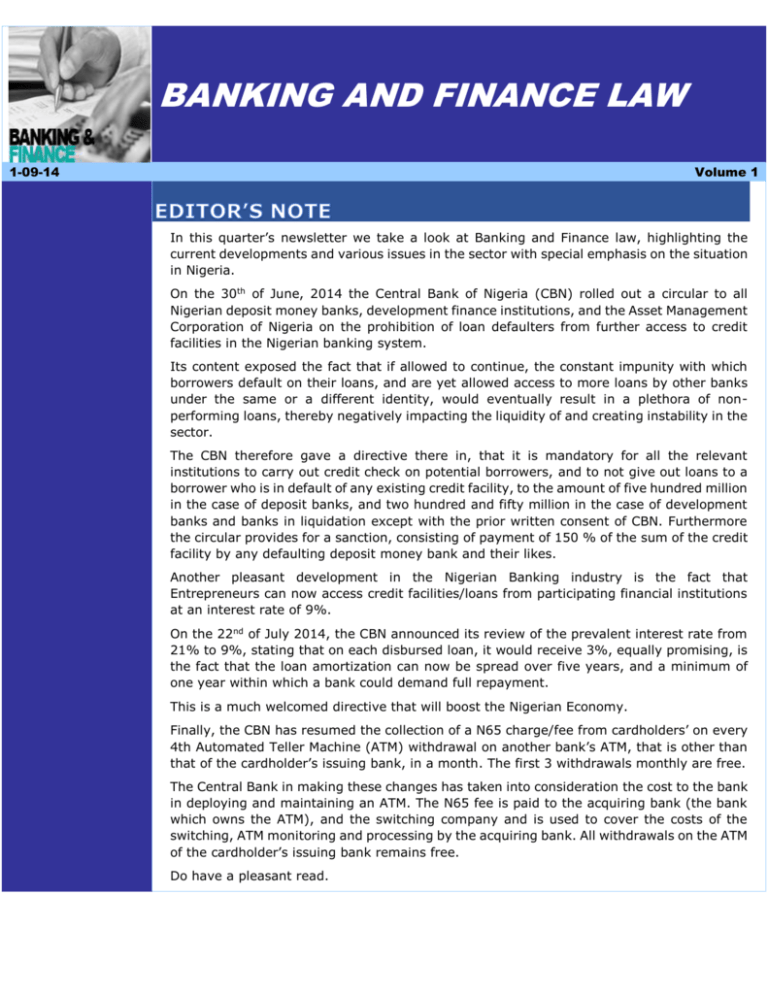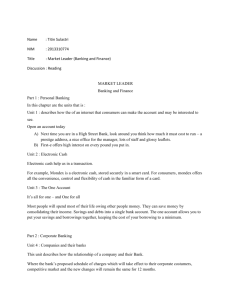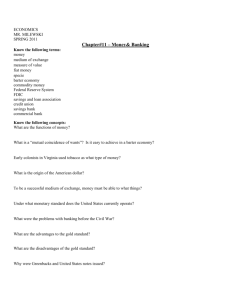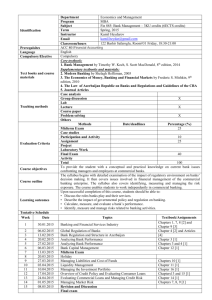
BANKING AND FINANCE LAW
1-09-14
Volume 1
In this quarter’s newsletter we take a look at Banking and Finance law, highlighting the
current developments and various issues in the sector with special emphasis on the situation
in Nigeria.
On the 30th of June, 2014 the Central Bank of Nigeria (CBN) rolled out a circular to all
Nigerian deposit money banks, development finance institutions, and the Asset Management
Corporation of Nigeria on the prohibition of loan defaulters from further access to credit
facilities in the Nigerian banking system.
Its content exposed the fact that if allowed to continue, the constant impunity with which
borrowers default on their loans, and are yet allowed access to more loans by other banks
under the same or a different identity, would eventually result in a plethora of nonperforming loans, thereby negatively impacting the liquidity of and creating instability in the
sector.
The CBN therefore gave a directive there in, that it is mandatory for all the relevant
institutions to carry out credit check on potential borrowers, and to not give out loans to a
borrower who is in default of any existing credit facility, to the amount of five hundred million
in the case of deposit banks, and two hundred and fifty million in the case of development
banks and banks in liquidation except with the prior written consent of CBN. Furthermore
the circular provides for a sanction, consisting of payment of 150 % of the sum of the credit
facility by any defaulting deposit money bank and their likes.
Another pleasant development in the Nigerian Banking industry is the fact that
Entrepreneurs can now access credit facilities/loans from participating financial institutions
at an interest rate of 9%.
On the 22nd of July 2014, the CBN announced its review of the prevalent interest rate from
21% to 9%, stating that on each disbursed loan, it would receive 3%, equally promising, is
the fact that the loan amortization can now be spread over five years, and a minimum of
one year within which a bank could demand full repayment.
This is a much welcomed directive that will boost the Nigerian Economy.
Finally, the CBN has resumed the collection of a N65 charge/fee from cardholders’ on every
4th Automated Teller Machine (ATM) withdrawal on another bank’s ATM, that is other than
that of the cardholder’s issuing bank, in a month. The first 3 withdrawals monthly are free.
The Central Bank in making these changes has taken into consideration the cost to the bank
in deploying and maintaining an ATM. The N65 fee is paid to the acquiring bank (the bank
which owns the ATM), and the switching company and is used to cover the costs of the
switching, ATM monitoring and processing by the acquiring bank. All withdrawals on the ATM
of the cardholder’s issuing bank remains free.
Do have a pleasant read.
SAFETY OF TRANSACTIONS IN ELECTRONIC BANKING
In Nigeria there are no laws governing electronic commerce/electronic banking, however
the practice of other jurisdictions such as the United Kingdom, is being applied in the
Nigerian Banking Sector.
One can enter into a banking contract via the internet, with the homepage of a banks website
being an “invitation to treat”, the customer being the one who makes an offer and the bank
website content owner being the one who decides whether or not to accept the offer.
It is an implied term in online banking contracts that a customer checks his email at least
once a day, mails are considered to be recallable during business hours of the day they have
been sent, and considered to be received on the day after the day they were sent.
It should be an express term of online banking contracts that the provider/content owner
informs the customer of the risk of fraud and forgery. An example of such a term could be
“The client accepts to give orders and have them dealt with via email. The client has been
explicitly informed that email and online contracts/transactions are subject to abuse, and as
such the provider is discharged from liability resulting from an abuse or misuse of the
transmission system”.
Furthermore it should be stated expressly with clear remarks that the banks email addresses
either, only serve for the transmission of information, and not for transactions/placing orders
or giving instructions or it serves for actual settlement of orders, in the latter case such
email should be checked regularly by the bank several times a day. The bank should also
have a clause in terms and conditions section of its website stating that there is a risk of
forgery in email transactions/transmission, an example is “If the client uses email to make
and deal with orders, it must be aware that abuses cannot be prevented, the provider/bank
is therefore completely discharged from liability that may result from an abuse of the
transmission system”.
The reality of possibility of input errors in online banking has resulted in the prevalent use
of “Confirmation Fields”. These confirmation field show the bank customer/ online banking
user, the text he/she has entered, to give an opportunity for correction, if needed.
One of the challenges to online banking is the written form required for contracts such as
loan agreements, sale of land contracts, surety ship declarations etc. Considering the fact
that it isn’t encouraging for valid conclusion of online contracts to fail due to legal form
requirements, it is suggested by the writer that embedded in the proposed bills on electronic
commerce, that there be clause which state that the fact that a contract has been made
electronically should not lead to its invalidity.
Consequently, in online banking terms and conditions agreements, it should be expressly
stated that the customer accepts the probative value of electronic documents as
documentary evidence, with the understanding that the question of the probative value of
digital documents will still largely be a matter of the discretion of the court/judge.
It goes without saying that an authentic online banking site must clearly show the name of
the service provider, the geographical address, email address and registered trade number
(RC number) number of the service provider. Proper details of price of transactions that is
whether subject to tax/delivery costs etc., should also be readily available on the site.
In addition, due to the banks duty to provide information, disclosure and advice, must emails
contain clauses stating for instance that “This email message is confidential and may contain
legally privileged information, if you are not the intended recipient, you should not read,
copy, distribute, or otherwise use the information in this email. This email may be
susceptible to data corruption, interception and unauthorized amendment, and we do not
accept liability for any such corruption, interception or amendment or consequences thereof.
Please telephone or fax us immediately and delete the message from your system”.
As relates to disclosure, the bank has a duty to inform its customers about foreseeable
system failures, interruptions by scheduled maintenance services and so on, while the
customer has a corresponding obligation to inform the bank of any loss of ATM, PIN code,
and any change in sensitive personal details. Most times clauses such as “ the customer is
obligated to keep the password and authorization codes secret and to prevent their misuse
by unauthorized persons, in particular, after it has been changed, the password must not
be written down or stored on the customer’s computer without protection. The customer
bears the consequences of any risk arising from the disclosure of PIN codes and other
authorization passwords.”
Finally the terms and conditions of the online banking contract must be provided to the
customer in a way that allows for storage and reproduction. The customer should also be
advised to give special care to the PIN code, bank secrecy and other sensitive data.
Online banking has really taken great strides, for instance, it is now possible to open a bank
account
on
Facebook,
the
latter
being
a
social
media
website,
see
www.facebook.com/gtbank. The process is simply log into your Facebook account, Go to
GTbank Facebook page at facebook.com/gtbank, Click on the Open an account link, Select
an account type e.g. GTCrea8, GTSave, Current or others, Enter your email address and
your location, Click on continue, Allow GTBank to access your profile when the popup
windows comes on, Confirm your personal details, Click on continue, Submit your
registration, Print or Make a note of you transaction code(TC), Complete your registration
at any bank branch after 2 weeks using your TC.
After you are through with the online registration at Facebook, wait for two weeks and then
visit your bank to complete the process using the following: Proof of address: PHCN bill,
Water bill or other recent utility bill, Personal identification: Driver's license, student id,
international passport, 2 passport photographs, Transaction code.
Once you provide your transaction code to the customer service personnel, he/she would
be able to quickly access the details you've already submitted on Facebook and this would
speed up your account opening process.
The downside of most online banking is that the associated risk is often borne by the
customer, who is held liable despite the fact that he is the one suffering damage. Therefore
it is common to see clauses that allocate the risk of internet use for banking, to the customer
based on the logic that the customer’s computer is the weak link in online banking.
It is expected however as technology advances that there will be a just distribution of risk,
as is prevalent in advanced countries, where for instance the credit card issuer is obliged to
refund 50% of money lost by a customer due to online credit card fraud or misuse of
passwords.
One of the ways for a customer to ensure safety in its online banking transactions is to make
sure he/she personally enters the full URL or website address of its bank, rather than clicking
on a link embedded on an email supposedly sent by the bank, as some online fraudsters
have cloned bank sites, using them to get access to customers password and ATM card PIN
codes.
Finally a secure website most times has the sign of “https” preceding the web address, a
shady website on the other hand may just read “http”. Despite the risks however, the ease
of online banking has done away with the phobia, and besides the courts are ever ready to
ensure justice is done in the event of a breach of either the customer or the bank’s
contractual right.
The GOS Newsletter has been prepared for clients and professional colleagues, it
is not meant to substitute legal advice. Please let us know if you would like to
discuss any issue in more detail; E-mail: b.sodipo@gosodipo.com
Copyright © 2014 G.O Sodipo & Co, All rights reserved.








